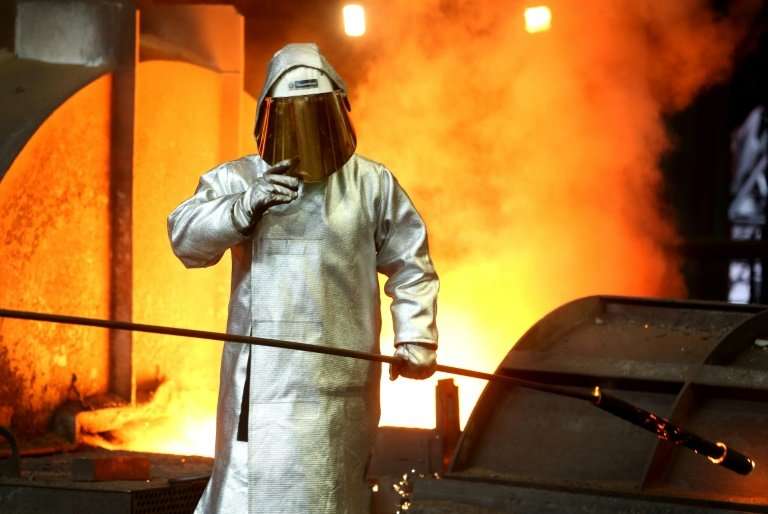Thyssenkrupp faces 'aggressive restructuring' after bosses quit (Update)

Turmoil has erupted at German industrial giant Thyssenkrupp after a mega deal merging its steelmaking arm with India's Tata, with its bosses quitting amid an acrimonious battle with shareholders on whether to break up the venerable institution.
The leadership chaos sparked fears of further job losses as some key investors push for redical surgery on the two-century-old conglomerate that makes everything from elevators and submarines to car components, turnkey industrial installations and steel.
"It is clear that Thyssenkrupp is at a crossroads... aggressive restructuring may be in the cards," analysts at US investment bank Jefferies wrote Tuesday after supervisory board chief Ulrich Lehner followed chief executive Heinrich Hiesinger out of the door late Monday.
Hiesinger, who quit earlier in July, and Lehner were both fierce defenders of keeping Thyssenkrupp's sprawling structure intact.
"I take this step consciously to enable a fundamental discussion with our shareholders on the future of Thyssenkrupp," Lehner said in his parting statement.
"A break-up of the company and the related loss of many jobs is not an option," he warned in a final swipe at his opponents.
Tracing its roots back to 1811 and a household name of German industry for over a century, Thyssenkrupp booked 41.5 billion euros ($48.7 billion) of revenue in its 2016-17 financial year and employs some 159,000 people worldwide.
July should have been a month of optimism for the Essen-based group, after it sealed a deal in late June with India's Tata to merge their European steel operations.
Bosses had hoped to find 400 to 500 million euros of annual savings, in part by shedding up to 4,000 jobs, persuaded that the merger would secure Thyssenkrupp's historic core against competition from a global flood of cheap Chinese steel.
But activist shareholders like Swedish investment firm Cevian and the US hedge fund Elliott want management to go further.
The two shareholders have been pushing for its dismantling with "methods that could even be described as psychological terrorism", Lehner told weekly Die Zeit earlier this month.
Beyond their fundamental differences with bosses over the company's direction, the investors also were displeased by the details of the Tata deal.
Hiesinger provided powerful German union IG Metall guarantees to preserve jobs and keep sites open.
'Power vacuum'
News that Hiesinger backer Lehner had quit bounced Thyssenkrupp's stock to the top of the DAX index of blue-chip German shares, gaining 8.6 percent to trade at 22.37 euros by 1100 GMT Tuesday.
The share price appears to have tracked investors' hopes of realising their dream of breaking up the group to sell off its units or list them independently on the stock market.
Its value had fallen in the wake of the Tata deal as the Alfried Krupp Foundation—the historic anchor shareholder which controls 21 percent of the firm—spoke out against unbundling its divisions.
But the institution, whose founding document calls for Thyssenkrupp to be preserved as a whole "as far as possible into the future", no longer has the blocking minority needed to hold off other shareholders.
Cevian and Elliott has a combined stake of about 20 percent of the group's shares, making them more or less evenly matched with the foundation and leaving neither side with an uncontested claim on leadership.
But foundation bosses' "muted" defence of the Tata tie-up "has clearly left a power vacuum filled by Cevian/Elliott," Jefferies analysts wrote.
"Activist investors are increasingly likely to come out on top... a broader break-up of Thyssenkrupp is increasingly likely," they added.
Business newspaper Handelsblatt predicted that "those who have to pay the price for this development could be the workers," with hoped-for savings at the different units after a breakup likely to come from more job losses.
Thyssenkrupp works council chief Wilhelm Segerath charged that "we're protecting the financial markets, but protecting too little industry and the real economy" in comments to news agency DPA.
"With the foundation and all the shareholders, we want to try and maintain the enterprise," he said.
© 2018 AFP





















